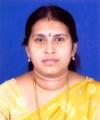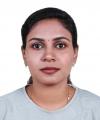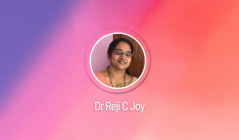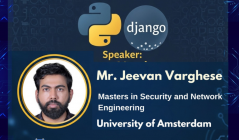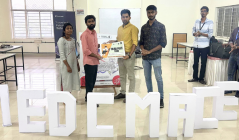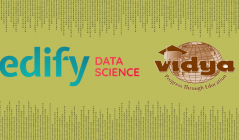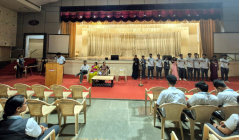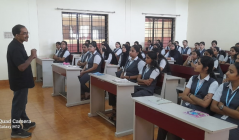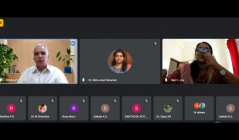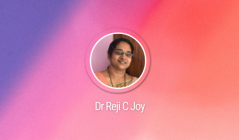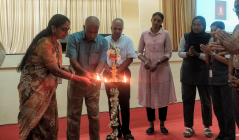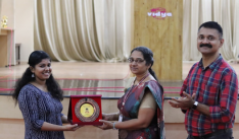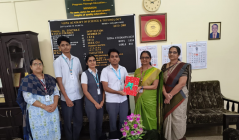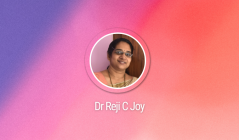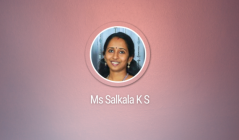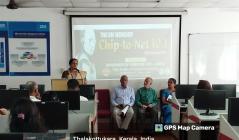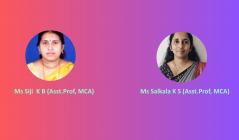Vidya Academy of Science & Technology
A unit of Vidya International Charitable Trust
Accredited by NAAC with "B++" grade
Department of Computer Applications

Phone / Email
04885287751
08281395555
mcahod@vidyaacademy.ac.in
About Us
The Department offers the two-year post-graduate course of Master of Computer Applications affiliated to APJ Abdul Kalam Technological University. The regular academic schedule of the department is designed to provide an in-depth and thorough coverage of the topics prescribed by the University in the syllabi of the programme. In addition, the Department organizes specialized academic activities to supplement the curriculum and to enhance the competitive edge of the students in facing the challenges of securing the best placement, and also the challenges of the workplace MCA students of the college have exclusive one–to-one computing facilities through a well-furnished separate Computer Lab. Internet connectivity is available in the Lab during the office hours.
VISION
Progress through education through assimilation, propagation, implementation and development of computer applications
MISSION
- To provide the best possible exposure to the theoretical bases of computer applications
- To create the right ambiance for the full personality development to meet the challenges of modern work place
- To help acquire the necessary practical skills in applying the acquired knowledge in industrial scenarios
PROGRAM OUTCOMES
PO1 : Computational Knowledge: Apply knowledge of computing fundamentals, computing specialization, mathematics, and domain knowledge appropriate for the computing specialization to the abstraction and conceptualization of computing models from defined problems and requirements.
PO2 : Problem analysis: Identify, formulate, research literature, and solve complex computing problems reaching substantiated conclusions using fundamental principles of mathematics, computing sciences and relevant domain disciplines.
PO3 : Design /Development of Solutions: Design and evaluate solutions for complex computing problems, and design and evaluate systems, components, or processes that meet specified needs with appropriate consideration for public health and safety, cultural, societal, and environmental considerations.
PO4 : Conduct investigations of complex Computing problems: Use research-based knowledge and research methods including design of experiments, analysis and interpretation of data, and synthesis of the information to provide valid conclusions.
PO5 : Modern Tool Usage: Create, select, adapt and apply appropriate techniques, resources, and modern computing tools to complex computing activities, with an understanding of the limitations.
PO6 : Professional Ethics: Understand and commit to professional ethics and cyber regulations, responsibilities, and norms of professional computing practices.
PO7 : Life-long Learning: Recognize the need, and have the ability, to engage in independent learning for continual development as a computing professional.
PO8 : Project management and finance: Demonstrate knowledge and understanding of the computing and management principles and apply these to one’s own work, as a member and leader in a team, to manage projects and in multidisciplinary environments.
PO9 : Communication Efficacy: Communicate effectively with the computing community, and with society at large, about complex computing activities by being able to comprehend and write effective reports, design documentation, make effective presentations, and give and understand clear instructions.
PO10 : Societal and Environmental Concern: Understand and assess societal, environmental, health, safety, legal, and cultural issues within local and global contexts, and the consequential responsibilities relevant to professional computing practices.
PO11 : Individual and Team Work: Function effectively as an individual and as a member or leader in diverse teams and in multidisciplinary environments.
PO12 Innovation and Entrepreneurship: Identify a timely opportunity and using innovation to pursue that opportunity to create value and wealth for the betterment of the individual and society at large.
PROGRAM SPECIFIC OUTCOMES
PSO1: Apply advanced principles and contemporary computing technologies to analyze, design, and implement robust solutions for intricate computational challenges.
PSO2: Develop skills to build software applications benefiting industrial operations, research initiatives, and educational practices.
PSO3: Develop a comprehensive understanding of project leadership principles and practices to drive software initiatives successfully, cultivate innovative thinking, and professional growth opportunities across technology domains.
Program Educational Objectives (PEOs)
PEO 01: Develop proficient technical and professional skills to effectively design, develop, and deploy computer applications across diverse sectors within the IT industry.
PEO 02: Develop the capacity to proficiently embrace emerging technologies and adapt promptly to evolving technological environments.
PEO 03: Strengthen collaborative and communication skills to excel as a valued team member, ensuring productivity and synergy within professional environments.
PEO 04: Encourage a proactive mind-set towards professional growth and societal impact, nurturing a commitment to continuous intellectual and professional advancement in the chosen field.
MCA students of VAST have certain exceptional advantages:
- The highly competitive and motivating ambience of an established engineering college.
- The superb physical infrastructure of a world-class institution.
- The support of an excellent Training and Placement Cell.
- Opportunities for interaction with a galaxy of committed, devoted, and experienced teaching professionals of a technological institution of higher learning.
Additional academic programmes conducted by the Department include:
- Off-hours training in emerging software technologies like Java, PHP, etc with the support of the Continuing Education Cell of the college.
HOD
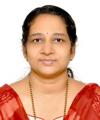
Dr. Reji C. Joy
M.C.A, Ph. D
Professor & HoD
04885287751 Ext : 150
Previous Experience :- 20 years of teaching experience.
Areas of Interest :- Image processing, Data Structures
PEOPLE
POs, PSOs & PEOs
PROGRAMME OUTCOMES
- PO1 : Computational Knowledge: Apply knowledge of computing fundamentals, computing specialization, mathematics, and domain knowledge appropriate for the computing specialization to the abstraction and conceptualization of computing models from defined problems and requirements.
- PO2 : Problem analysis: Identify, formulate, research literature, and solve complex computing problems reaching substantiated conclusions using fundamental principles of mathematics, computing sciences and relevant domain disciplines.
- PO3 : Design /Development of Solutions: Design and evaluate solutions for complex computing problems, and design and evaluate systems, components, or processes that meet specified needs with appropriate consideration for public health and safety, cultural, societal, and environmental considerations.
- PO4 : Conduct investigations of complex Computing problems: Use research-based knowledge and research methods including design of experiments, analysis and interpretation of data, and synthesis of the information to provide valid conclusions.
- PO5 : Modern Tool Usage: Create, select, adapt and apply appropriate techniques, resources, and modern computing tools to complex computing activities, with an understanding of the limitations.
- PO6 : Professional Ethics: Understand and commit to professional ethics and cyber regulations, responsibilities, and norms of professional computing practices.
- PO7 : Life-long Learning: Recognize the need, and have the ability, to engage in independent learning for continual development as a computing professional.
- PO8 : Project management and finance: Demonstrate knowledge and understanding of the computing and management principles and apply these to one’s own work, as a member and leader in a team, to manage projects and in multidisciplinary environments.
- PO9 : Communication Efficacy: Communicate effectively with the computing community, and with society at large, about complex computing activities by being able to comprehend and write effective reports, design documentation, make effective presentations, and give and understand clear instructions.
- PO10 : Societal and Environmental Concern: Understand and assess societal, environmental, health, safety, legal, and cultural issues within local and global contexts, and the consequential responsibilities relevant to professional computing practices.
- PO11 : Individual and Team Work: Function effectively as an individual and as a member or leader in diverse teams and in multidisciplinary environments.
- PO12 : Innovation and Entrepreneurship: Identify a timely opportunity and using innovation to pursue that opportunity to create value and wealth for the betterment of the individual and society at large.
PROGRAMME SPECIFIC OUTCOMES
- PSO1: Apply advanced principles and contemporary computing technologies to analyze, design, and implement robust solutions for intricate computational challenges.
- PSO2: Develop skills to build software applications benefiting industrial operations, research initiatives, and educational practices.
- PSO3: Develop a comprehensive understanding of project leadership principles and practices to drive software initiatives successfully, cultivate innovative thinking, and professional growth opportunities across technology domains.
PROGRAMME EDUCATIONAL OBJECTIVES (PEOs)
- PEO 01: Develop proficient technical and professional skills to effectively design, develop, and deploy computer applications across diverse sectors within the IT industry.
- PEO 02: Develop the capacity to proficiently embrace emerging technologies and adapt promptly to evolving technological environments.
- PEO 03: Strengthen collaborative and communication skills to excel as a valued team member, ensuring productivity and synergy within professional environments.
- PEO 04: Encourage a proactive mind-set towards professional growth and societal impact, nurturing a commitment to continuous intellectual and professional advancement in the chosen field.
COs
Syllabus
APJAK Technological University
To view the ordinance, regulations, curriculum and syllabi of the MCA programme of APJ Abdul Kalam Technological University, click on the following links:
Infrastructure
Infrastructure for the exclusive use of the Department of Computer Applications include the following:
- A fully air-conditioned separate Computer Lab with state of the art machines equipped with a rich collection of free software
- An exclusive seminar hall with a public address system, LCD projector and other accessories
- Class rooms equipped with LCD projectors
- A Departmental Library with a collection of books for quick references and with provisions for maintaining repositories of students-created documents like project and seminar reports
- A Tutorial Room for conducting classes for smaller batches of students
Contact Us
Campus:
Kurumal, Thalakottukara P.O., Near Kaiparambu,
Thrissur - 680501, Kerala, India
Phone: +91-4885-287751 / 287752,
Fax: +91-4885-288366
Email: principal@vidyaacademy.ac.in
Corp. Office:
Sun Tower, East Fort,
Thrissur - 680005,
Kerala, India
Phone: +91-487-2442571 / 2442572,
Fax: +91-487-2442572
Email: vidyaict@vidyaacademy.ac.in
Dept. Activities
Some of the activities of the department
- Orientation Programme for freshers
- Workshop on Google sites
- Workshops on LaTeX
- Workshops on Malayalam computing
- MindSparkZ : A miniserial quiz
- Chip-to-Net : Workshops for the students of neighbouring arts and science colleges
- eSpiderZ : Website creation contest
- National/International level seminars like, WebWare, NChip, PoSiCom
Department Magazine
Achievements
-
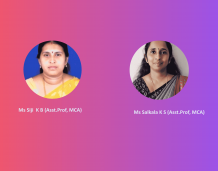 Congratulations on Faculty PromotionsThe Department congratulates Ms. Siji K. B. on her promotion to Assistant Professor (Selection Grade) and Ms. Salkala K. S. on her...
Congratulations on Faculty PromotionsThe Department congratulates Ms. Siji K. B. on her promotion to Assistant Professor (Selection Grade) and Ms. Salkala K. S. on her... -
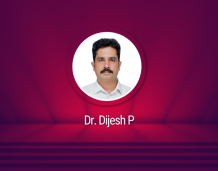 Dr Dijesh P on a successful PhD defenseMr. Dijesh P (Asso Prof, MCA), who successfully defended his PhD thesis on 11 April 2025 at Bharathiar University, Coimbatore.
Dr Dijesh P on a successful PhD defenseMr. Dijesh P (Asso Prof, MCA), who successfully defended his PhD thesis on 11 April 2025 at Bharathiar University, Coimbatore. -
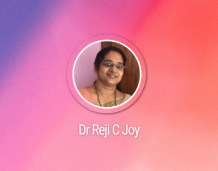 MCA HoD Dr. Reji C Joy successfully completes NPTELVidya faculty members reinforce their commitment to academic excellence by attending NPTEL Certification
MCA HoD Dr. Reji C Joy successfully completes NPTELVidya faculty members reinforce their commitment to academic excellence by attending NPTEL Certification -
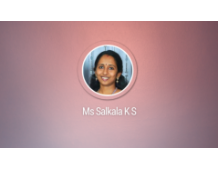 MCA faculty member successfully completes NPTEL courseVidya faculty members showcase a commendable commitment to continuous learning and profession
MCA faculty member successfully completes NPTEL courseVidya faculty members showcase a commendable commitment to continuous learning and profession -
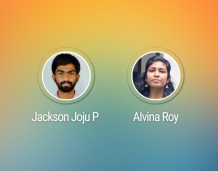 MCA students participate in Udyama 1.0Jackson Joju P (S1,MCA) and Alvina Roy (S1,MCA) participated in the Project Expo conducted as part of Udyma 1.0 during 7-10 December, 2024
MCA students participate in Udyama 1.0Jackson Joju P (S1,MCA) and Alvina Roy (S1,MCA) participated in the Project Expo conducted as part of Udyma 1.0 during 7-10 December, 2024 -
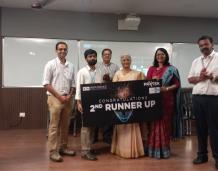 S1 MCA student bags Third Prize at Student Startup ExpoJackson Joju P., S1 MCA student, secured the third prize at the Student Startup Expo
S1 MCA student bags Third Prize at Student Startup ExpoJackson Joju P., S1 MCA student, secured the third prize at the Student Startup Expo -
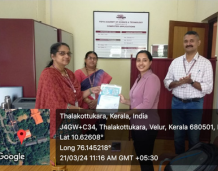 MCA Dept signed MoU with ZiukeInfotech Pvt LtdMemorandum of Understanding (MoU) between the MCA Department and ZiukeInfotech Pvt Ltd, Thrissur.
MCA Dept signed MoU with ZiukeInfotech Pvt LtdMemorandum of Understanding (MoU) between the MCA Department and ZiukeInfotech Pvt Ltd, Thrissur. -
 MCA Dept conducts add-on-course on Web HostingThe Department of MCA has organised an Add-on-Course on "Web Hosting Management" for all fifth semester MCA students
MCA Dept conducts add-on-course on Web HostingThe Department of MCA has organised an Add-on-Course on "Web Hosting Management" for all fifth semester MCA students
WHAT'S NEW
Information
Address
Vidya Academy of Science & Technology
Thalakottukara P.O., Kecheri, Thrissur - 680501, Kerala, India
Phone: +91 4885 287751, 287752
Fax: +91 4885 288366
E-Mail: principal@vidyaacademy.ac.in
VICT | Vidya Kilimanoor | IT Division
locate us
Affiliated to APJ Abdul Kalam Technological University & Approved by AICTE | ISO 9001 : 2015
Copyright © 2025, www.vidyaacademy.ac.in. All Rights Reserved.


